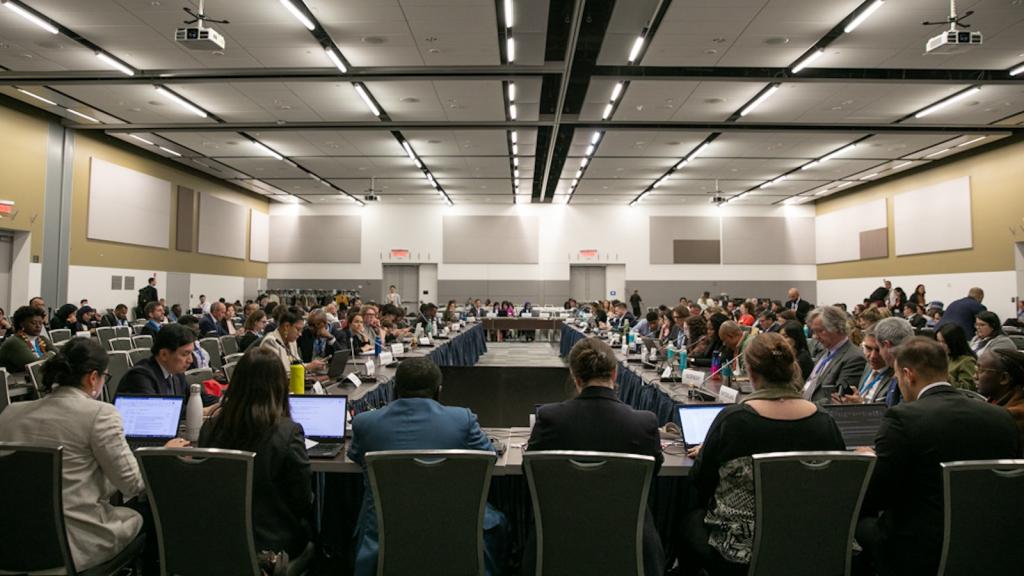 Idly watching TV the other day, my attention was caught by the arresting image of Al Sharpton and Pat Robertson sitting on a sofa. The artfully shot, 15-second spot is one of the first blitz of television ads from We Can Solve It, Al Gore’s $300 million project to build up a public base of support for climate action.
Idly watching TV the other day, my attention was caught by the arresting image of Al Sharpton and Pat Robertson sitting on a sofa. The artfully shot, 15-second spot is one of the first blitz of television ads from We Can Solve It, Al Gore’s $300 million project to build up a public base of support for climate action.
The two resemble each other, looking as sleek and plump as sea otters after a good feed. Sharpton and Robertson fence good naturedly, following the strange-bedfellows format of the ad series. Robertson puns, “So get involved; it’s the ‘right’ thing to do,” and Sharpton ripostes with the Reagan line, “Now there you go again!”
The thing is well done and I enjoyed it, but I was also aggravated by the choice of spokespersons — and the more I thought about it, troubled by the deeper meaning of the ad.
 The spot is aggravating because Pat Robertson is a ruthless, stone enemy of environmentalists and nothing in his calculating Damascus-road conversion has changed that fact. When he sensed the Creation Care movement gaining strength within the ranks of evangelicals and charismatics, he readjusted quickly.
The spot is aggravating because Pat Robertson is a ruthless, stone enemy of environmentalists and nothing in his calculating Damascus-road conversion has changed that fact. When he sensed the Creation Care movement gaining strength within the ranks of evangelicals and charismatics, he readjusted quickly.
In a fawning interview with then Senate Energy Committee Chair Jim Inhofe in 2005, Robertson asked setup questions such as, “What is the agenda of the radical Left? They talk about — aren’t environmental concerns sort of like a god to them?”
By summer 2006, Robertson declared that high temperatures had made a climate change believer out of him:
In the spring of 2007, when prominent conservative preachers tried and failed to oust Richard Cizik from his position as vice president of government relations for the National Association of Evangelicals over his outspoken support for climate action, Robertson was conspicuously absent.
Think of Robertson as the Christian Right equivalent of BP. By mouthing general agreement with environmentalists, he has won praise and a great deal of media attention at relatively low political expense. For both Robertson and BP, climate is a cost effective means of adding value to an extensive product line, improving corporate image with key market segments, and smoothing a growing point of friction with government.
The difference is that BP is disarmingly honest while cavalier in its aggressive expansion of extractions, while Robertson is merely mendacious. There is an intense struggle going on between creation care advocates and the pro-fossil fuel counter-response (recently repackaged with the name We Get It, under the slogan Caring for the Environment and the Poor, Biblically). In a debate in which “it’s the right thing to do,” Robertson is steadfastly silent.
That is what’s aggravating. What’s troublesome is that the spot features one talking head who denies that he ever admitted reality and another for whom climate change is merely one of a laundry list of liberal Democrat issues to which lip service must be rendered during election years. Robertson and Sharpton are political opportunists. Both lack ideological bearings and a moral compass, and neither of these guys believe that climate change is in any way a major crisis.
A check of Sharpton’s National Action Network finds no mention of climate change; a search of Robertson’s Christian Broadcasting Network and 700 Club turns up the following statement, released March 20, 2008:
While Pat Robertson has never taken a position on the question of global warming, he does share Gore’s concern for being a good environmental steward and doing everything within our power to protect our natural resources. [emphasis added]
To present Sharpton and Robertson as spokespersons for climate action is as hollow, weak, and contrived as dubbing George W. Bush "the education president.” It reinforces the gestalt — the unspoken, unintended essence of all our climate efforts — that we don’t believe what we are saying.
People who accept climate change realities are moved by it. Facing cataclysm changes lives. People like Nancy LaPlaca in Denver, Colo., give up comfortable jobs to devote themselves full time to climate action. Parents, like my friend Andrèe Zaleska, rethink what kind of education will be most useful to their children; perhaps gardening skills will be more useful than algebra. Retirees like Adam Sachs who might have spent their golden years fishing instead devote their hours to updating climate websites.
Those who accept reality — irrespective of whether they feel hopeful, worried, or depressed as hell — share the weight of a great moral burden and feel an urgency that makes ordinary aspects of life cause for fretting and fidgeting.
How did we come to this place? We listened to Ross Gelbspan, Bill McKibben, Jim Hansen, Al Gore, and a handful of others. What we got was a bushel of charts, graphs, and figures, but facts alone would not have moved us. It is the moral weight of conviction behind the plain truth of information that opens minds.
If we are going to spend $300 million to hire actors to play the part of climate advocates, let’s at least get bigger box office draws. If we want to have an impact, however, then we must have spokespersons and leaders who believe what they are saying.
 Idly watching TV the other day, my attention was caught by the arresting image of Al Sharpton and Pat Robertson sitting on a sofa. The artfully shot, 15-second spot is one of the first blitz of television ads from
Idly watching TV the other day, my attention was caught by the arresting image of Al Sharpton and Pat Robertson sitting on a sofa. The artfully shot, 15-second spot is one of the first blitz of television ads from 
